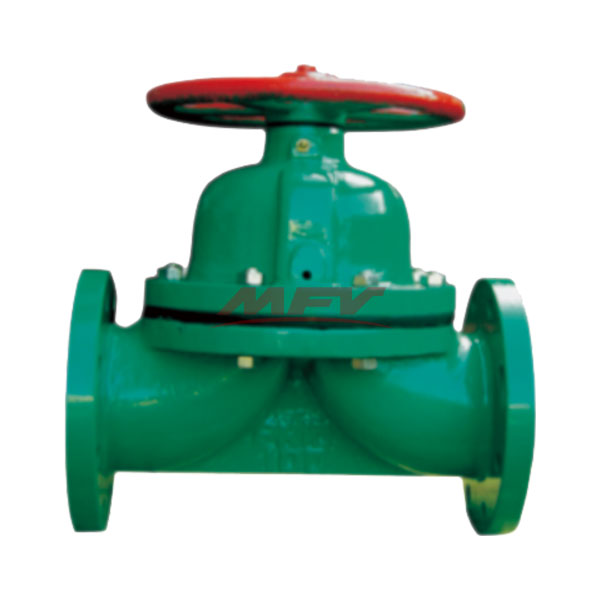Lined diaphragm valve

Lined diaphragm valve
Nominal diameter: DN65 ~ 200mm
Nominal pressure: PN10 ~ 16MPa
Drive: worm gear, electric, pneumatic, manual
Temperature: -40 ℃ ~ 100 ℃
Suitable medium: good acid and alkali resistance. Stream 85% acid, hydrochloric acid, Hydrofluoric acid, phosphoric acid, alkali and various esters charge
Main material: cast iron, ductile iron, steel, stainless steel
G41G Lined Diaphragm Valve Features
1. This series of valves are the introduction, digestion and absorption of the United Kingdom Saunders Valve proprietary technology manufacturing products.
Liner diaphragm valve and other valves the biggest difference is that: the use of packing structure letter; rubber diaphragm can make the corridor in the corrosive media and all the drive components in a fully isolated state, thereby eliminating the usual valve " Run, run, drip, drain "and other defects.
3. Due to the smooth flow of diaphragm valve, flow resistance is small, so you can get a larger flow.
4. Depending on the diaphragm valve body cavity surface as the hall for the choice of a variety of rubber. It has excellent corrosion resistance.
5. Because the seal is a flexible rubber diaphragm. So it also has better sealing and the minimum closing force.
6. The valve by the valve body, valve cover, disc, stem, diaphragm and other drive components and other components.
7. Valve opening and closing is achieved by rotating the hand wheel. The valve marked on the top of the valve can be glimpsed at the valve opening or closing the display color to indicate the valve opening and closing stroke. When the handwheel is placed clockwise, the handwheel is moved downward, and the valve disc is driven to lower the diaphragm to cut off the passageway; otherwise, the valve is opened and the color is revealed.
8. The standard valve: in accordance with the provisions of GB12239 and meet the requirements of BS5156.
G41G lined diaphragm valve product use
Diaphragm rubber diaphragm valve according to different depending on the material for different temperatures at different fluid medium pipeline, as the flow control of the opening and closing institutions
G41G lining rubber diaphragm valve depending on the recommended range of use of the material
Depending on the material (code) | proper temperature | Suitable media |
Hard rubber (NR) | -10 ℃ ~ 85 ℃ | Hydrochloric acid, fluorosilicic acid, formic acid and phenolic acids, hydrochloric acid, 30% of flow acid and 50% of hydrofluoric acid are used in addition to strong oxidizing agents (such as pinacid, chromic acid, concentrated sulfuric acid and hydrogen peroxide) Acid, 80% phosphoric acid, alkali, salts, metallized solution, sodium hydroxide, potassium hydroxide, neutral saline solution, 10% sodium hypochlorite, wet chlorine, ammonia, most alcohols, organic acids and aldehydes. |
Soft rubber (BR) | -10 ℃ ~ 85 ℃ | Has good wear resistance. Mainly used in 50% of the following acid, sodium hydroxide, potassium hydroxide, neutral salt bath solution and ammonia, cement, clay, cinder ash, granular fertilizer and abrasive solid fluid, thick Mucus and so on. |
Butyl gum (IIR) | -10 ℃ ~ 120 ℃ | Anti-corrosion, wear resistance. Very resistant to most organic acids, alkalis and hydroxides, inorganic salts and inorganic acid gas, alcohols, aldehydes, ethers, ketones, esters and so on. |
Neoprene | (CR) -10 ° C to 120 ° C | Animal oils, vegetable and inorganic oils, and aggressive slurries with a wide range of pH values provide good abrasion resistance. |
Cast iron is not wrapped | -40 ℃ ~ 100 ℃ | Non-corrosive media |
G41G lined diaphragm valve diaphragm Recommended use of material:
Diaphragm material (code) | Suitable temperature | Suitable media |
Butyl gum (Grade B) | -40 ℃ ~ 100 ℃ | Good acid and alkali resistance. 85% flow acid, |
Natural rubber (Q grade) | -50 ℃ ~ 100 ℃ | For purifying water, inorganic salts, dilute mineral acids. |
G41G lined diaphragm valve main performance parameters:
model | Nominal diameter DN (mm) | Working pressure WP (Mpa) | Test pressure (Mpa) | Test temperature (℃) | |
seal | strength | ||||
G41J W-16 | 20-50 | 1.6 | 1.76 | 2.4 | Room temperature |
G41J W-10 | 65-200 | 1.0 | 1.1 | 1.5 | |
G41G lined diaphragm valve main connection size
DN (mm) | PN (MPa) | WP (MPa) | Main dimensions (mm) | The scope of application | Weight (kg) | |||||||||
L | D1 | D | D0 |
| Z | H | Temperature | medium | ||||||
J-type | W-type | J-type | W-type |
| ||||||||||
20 | 1.6 | 1.6 | 121 | 117 | 75 | 105 | 70 | 13.5 | 4 | 103 | Less than or | Generally corrosive | Non-corrosive | 3 |
25 | 131 | 127 | 85 | 115 | 83 | 112 | 4.3 | |||||||
32 | 150 | 146 | 100 | 140 | 114 | 17.5 | 144 | 6.5 | ||||||
40 | 163 | 159 | 110 | 150 | 156 | 7.9 | ||||||||
50 | 194 | 190 | 125 | 165 | 140 | 177 | 10.6 | |||||||
65 | 1.0 | 1.0 | 220 | 216 | 145 | 185 | 165 | 164.5 | 17.6 | |||||
80 | 258 | 254 | 160 | 200 | 230 | 8 | 181.5 | 25.5 | ||||||
100 | 309 | 305 | 180 | 220 | 280 | 253 | 36.2 | |||||||
125 | 362 | 356 | 210 | 250 | 282 | 47.5 | ||||||||
150 | 412 | 406 | 240 | 285 | 368 | 366.5 | 74 | |||||||
200 | 527 | 521 | 295 | 342 | 483 | 22 |
| 143 | ||||||










